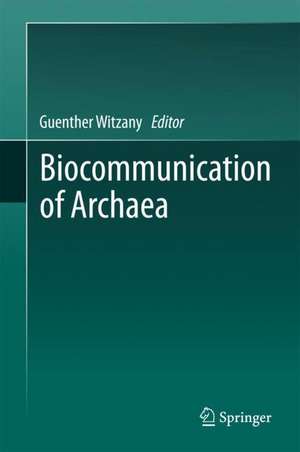Biocommunication of Archaea
Editat de Guenther Witzanyen Limba Engleză Hardback – 10 oct 2017
mediated communication processes within archaeal cells (intra-organismic), between the same, related and different archaeal species (interorganismic), and between archaea and nonarchaeal organisms (transorganismic). This is crucial in coordinating growth and development, shape and dynamics. Such communication must function both on the local level and between widely separated colony parts. This allows archaea to coordinate appropriateresponse behaviors in a differentiated manner to their current developmental status and physiological influences. This book will orientate further investigations on how archaeal ecosphere inhabitants communicate with each other to coordinate their behavioral patterns and whats the role of viruses in this highly dynamic interactional networks.
| Toate formatele și edițiile | Preț | Express |
|---|---|---|
| Paperback (1) | 799.79 lei 38-44 zile | |
| Springer International Publishing – 18 mai 2018 | 799.79 lei 38-44 zile | |
| Hardback (1) | 801.38 lei 38-44 zile | |
| Springer International Publishing – 10 oct 2017 | 801.38 lei 38-44 zile |
Preț: 801.38 lei
Preț vechi: 1054.45 lei
-24% Nou
Puncte Express: 1202
Preț estimativ în valută:
153.36€ • 158.43$ • 127.64£
153.36€ • 158.43$ • 127.64£
Carte tipărită la comandă
Livrare economică 22-28 martie
Preluare comenzi: 021 569.72.76
Specificații
ISBN-13: 9783319655352
ISBN-10: 3319655353
Pagini: 324
Ilustrații: XX, 324 p. 51 illus., 35 illus. in color.
Dimensiuni: 155 x 235 mm
Greutate: 0.7 kg
Ediția:1st ed. 2017
Editura: Springer International Publishing
Colecția Springer
Locul publicării:Cham, Switzerland
ISBN-10: 3319655353
Pagini: 324
Ilustrații: XX, 324 p. 51 illus., 35 illus. in color.
Dimensiuni: 155 x 235 mm
Greutate: 0.7 kg
Ediția:1st ed. 2017
Editura: Springer International Publishing
Colecția Springer
Locul publicării:Cham, Switzerland
Cuprins
Preface.- 1. Introduction: Keylevels of Biocommunication of Archaea.- 2. The Cooccurrence of Archaea and Bacteria among Diverse Globally Distributed Ecosystems.- 3. Direct Interspecies Electron Transfer Between Archaea and Bacteria.- 4. Why Archaea are Limited in their Exploitation of Other, Living Organisms.- 5. Archaeal Surface Structures and Their Role in Communication with the Extracellular Environment.- 6. Archaeal Biocommunication in Hot Springs Revealed by Metagenomics.- 7. Sexual Communication in Archaea, the Precursor to Eukaryotic Meiosis.- 8. Quorum Sensing in Archaea: Recent Advances and Emerging Directions.- 9. Biofilm Lifestyle of Thermophile and Acidophile Archaea.- 10. The Compressed Vocabulary of the Proteins of Archaea.- 11. KaiC-like ATPases as Signal Transduction Hubs in Archaea.- 12. Archaea were Trailblazers in Signaling Evolution: Protein Adaptation and Structural Fluidity as a Form of Intracellular Communication.- 13. Protein Phosphorylation-Dephosphorylationand Signal Processing in the Archaea.- 14. Secondary Metabolites in Archaea and Extreme Environments.- 15. Evolutionary Interaction Between Archaeal-Eukaryal Cell Lineages and Viruses.- 16. Inteins as Indicators of Bio-Communication.- 17. Riboswitches: Regulatory ncRNAs in Archaea.- 18. DNA Damage Repair in Archaea.- 19. Archaeal Lipids as an Adaptation to Higher Temperatures?
Notă biografică
Dr. Guenther Witzany, Telos- Philosophische Praxis, Buermoos, Salzburg, Austria
Textul de pe ultima copertă
Archaea represent a third domain of life with unique properties not found in the other domains. Archaea actively compete for environmental resources. They perceive themselves and can distinguish between ‘self’ and ‘non-self’. They process and evaluate available information and then modify their behaviour accordingly. They assess their surroundings, estimate how much energy they need for particular goals, and then realize the optimum variant.
These highly diverse competences show us that this is possible owing to sign(aling)- mediated communication processes within archaeal cells (intra-organismic), between the same, related and different archaeal species (interorganismic), and between archaea and non-archaeal organisms (transorganismic).
This is crucial in coordinating growth and development, shape and dynamics. Such communication must function both on the local level and between widely separated colony parts. This allows archaea to coordinate appropriate response behaviors in a differentiated manner to their current developmental status and physiological influences.
This book will orientate further investigations on how archaeal ecosphere inhabitants communicate with each other to coordinate their behavioral patterns and whats the role of viruses in this highly dynamic interactional networks.
These highly diverse competences show us that this is possible owing to sign(aling)- mediated communication processes within archaeal cells (intra-organismic), between the same, related and different archaeal species (interorganismic), and between archaea and non-archaeal organisms (transorganismic).
This is crucial in coordinating growth and development, shape and dynamics. Such communication must function both on the local level and between widely separated colony parts. This allows archaea to coordinate appropriate response behaviors in a differentiated manner to their current developmental status and physiological influences.
This book will orientate further investigations on how archaeal ecosphere inhabitants communicate with each other to coordinate their behavioral patterns and whats the role of viruses in this highly dynamic interactional networks.
Caracteristici
First uniform description of key levels of communication in Archaea Will orientate further research in Archaea The first book to systematize these levels of sign(aling) Includes supplementary material: sn.pub/extras
